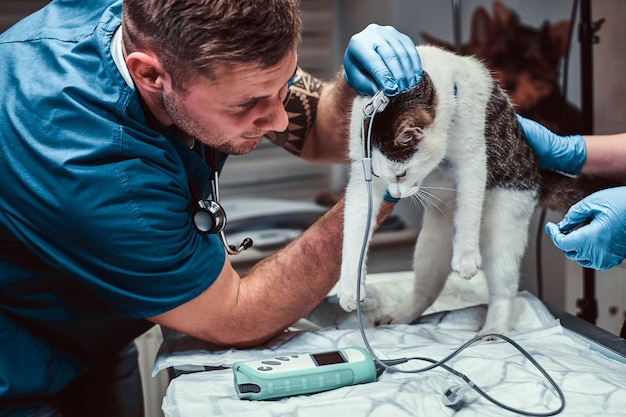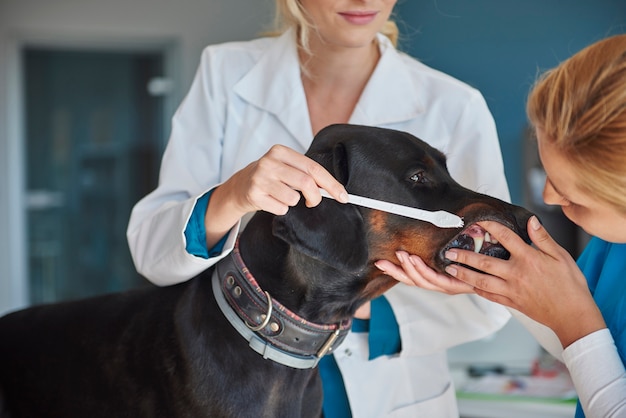Understanding Laser Surgery for Pets: Benefits and Process Explained


Understanding Laser Surgery for Pets: Benefits and Process Explained
If you are a pet owner, you may have heard about laser surgery for pets and wondered whether it could be the right option for your furry companion. At Pets Ahoy Animal Hospital, located at 21856 23 Mile Rd, Macomb, MI 48042, we understand that choosing the best surgical care for your pet can feel overwhelming. With over 35 years of experience serving Macomb and surrounding communities, our veterinary team is dedicated to providing advanced, compassionate care—including the latest in veterinary laser procedures. This blog will help you understand what laser surgery for pets involves, its benefits, and how our approach to veterinary laser procedures in Macomb puts your pet’s comfort and safety first. You’ll also learn about common conditions treated with laser technology, how to recognize when surgery might be needed, and what to expect before, during, and after the procedure. If you’re searching for a "vet near me" who offers modern surgical options and personalized care, you’re in the right place. For pet owners interested in comprehensive care, we encourage you to explore our wellness plans that support your pet’s lifelong health.
Recognizing When Your Pet May Need Laser Surgery
Deciding if your pet requires any surgical intervention can be daunting. Laser surgery for pets is often recommended for specific conditions where precision, reduced pain, and faster healing are important. As a pet owner, it’s helpful to recognize potential signs that may indicate your pet could benefit from veterinary laser procedures in Macomb.
Key symptoms or situations where laser surgery might be considered include growths or lumps on the skin that change in size or appearance, chronic ear problems that do not respond to medication, inflamed or bleeding gums, mouth tumors, or wounds that are slow to heal. Additionally, certain soft tissue conditions—such as cysts, warts, or elongated soft palates in dogs—are often managed more effectively with laser technology. For example, if your pet has experienced recurring dental infections despite regular cleanings, our team may recommend a laser-assisted procedure for improved results.
Owners should also watch for subtle changes in behavior that could signal discomfort. These include reluctance to be touched in certain areas, decreased appetite, increased drooling, or persistent licking at a sore spot. If you notice any of these signs, scheduling an appointment with your local veterinary team for a thorough assessment is the best first step. Our veterinarians in Macomb will perform a detailed examination to determine whether veterinary laser procedures are appropriate for your pet’s needs.
How Laser Surgery for Pets Works: Causes and Background
Laser surgery for pets uses a focused beam of light energy to precisely cut, vaporize, or coagulate tissue. This advanced approach differs from traditional scalpel-based surgery in several ways and is valued for its minimally invasive nature. Veterinary laser procedures in Macomb are particularly beneficial for animals with conditions that require delicate handling of tissues or where minimizing bleeding and discomfort is a priority.
The science behind laser surgery centers on the laser’s ability to seal nerve endings and blood vessels as it operates, which results in less pain and swelling for your pet. This technique is especially advantageous for procedures involving sensitive oral tissues, skin growth removals, and some internal surgeries. The reduced trauma to surrounding tissues means many pets experience shorter recovery times and fewer postoperative complications.
Laser surgery can be used for a wide range of conditions, including oral tumors, gingival hyperplasia, skin masses, entropion (eyelid correction), and select soft tissue procedures. The choice to use a laser versus traditional methods is based on the specific diagnosis, your pet’s overall health, and the desired surgical outcomes. At Pets Ahoy Animal Hospital, our veterinarians carefully evaluate each case to ensure that every pet receives the most appropriate and effective treatment available.
Treatment Options: What to Expect During Veterinary Laser Procedures in Macomb
When your pet is scheduled for laser surgery at Pets Ahoy Animal Hospital, our veterinary professionals will walk you through each step to ensure you feel informed and comfortable with the process. The journey begins with a comprehensive preoperative exam, where we assess your pet’s health and discuss anesthesia protocols tailored to their needs. You can learn more about our anesthesia and patient monitoring protocols, which are designed to maximize safety and comfort throughout the procedure.
During the surgery itself, the veterinarian uses a handheld laser device to perform the precise tissue removal or correction needed. The laser’s ability to seal small blood vessels as it works means that most procedures involve significantly less bleeding than traditional methods. Additionally, the risk of postoperative infection is reduced because the laser sterilizes as it cuts.
For dental surgeries, such as the removal of oral tumors or treatment of advanced periodontal disease, the laser is particularly effective at minimizing pain and promoting faster healing. Our veterinary team in Macomb is highly trained in these advanced surgical techniques, ensuring your pet receives the best care possible.
After the procedure, pets typically recover more quickly and with less discomfort compared to conventional surgery. Most animals return home the same day and experience less swelling, reduced need for pain medication, and a faster return to normal activities. Our veterinarians will provide you with detailed aftercare instructions and schedule follow-up visits to monitor your pet’s recovery. Should your pet require additional pain control, we also offer pain management and control services tailored to each patient’s needs.
Preventive Care and Home Support: Helping Your Pet Heal
Supporting your pet’s recovery after laser surgery involves several steps that pet owners can take at home, as well as ongoing preventive care. After any veterinary laser procedure in Macomb, it’s essential to follow your veterinarian’s recommendations regarding rest, wound care, and medication administration.
Typically, pets benefit from a quiet environment where they can rest undisturbed for the first few days. Monitoring the surgical site for signs of redness, swelling, or discharge is important, and you should contact your veterinarian if you notice anything unusual. Prevent your pet from licking or scratching the area by using an Elizabethan collar or another protective device if recommended.
Additionally, keeping follow-up appointments allows your veterinary team to assess healing and adjust care as needed. Preventive measures such as regular dental cleanings, weight management, and routine wellness exams can help reduce the risk of future surgical needs. For pet owners who want to stay proactive, our wellness plans are an excellent way to ensure ongoing support for your pet’s health.
When to Seek Veterinary Care for Laser Surgery: Guidelines for Pet Owners
Knowing when to consult your veterinarian about surgical options is crucial for your pet’s health and comfort. If you observe persistent lumps, chronic oral problems, non-healing wounds, or behavioral changes such as increased hiding or vocalization, it’s time to schedule an appointment for a professional evaluation. Veterinary laser procedures in Macomb are most effective when conditions are addressed early, so prompt attention can make a significant difference in your pet’s outcome.
Pet owners in Macomb and surrounding communities should trust their instincts if something seems amiss; even subtle changes in your pet’s habits or appearance may signal a need for medical intervention. If your pet has already undergone surgery and you notice signs such as excessive swelling, bleeding, loss of appetite, or lethargy, immediate veterinary attention is warranted.
Remember, only a licensed veterinarian can determine whether laser surgery is the right choice for your pet. Our veterinary professionals are always available to discuss your concerns, explain treatment options, and provide guidance on the next steps. If you are searching for a "quality veterinary services near me" that offer advanced surgical care, our team is ready to help.
Conclusion: Advanced Pet Surgery and Compassionate Care in Macomb
Laser surgery for pets is an innovative, minimally invasive solution that offers faster healing, less pain, and improved outcomes for many common conditions. At Pets Ahoy Animal Hospital in Macomb, our veterinary team combines expertise, advanced technology, and a caring approach to ensure your pet receives the highest level of care. Whether you are considering veterinary laser procedures in Macomb for a specific health concern or exploring preventive options to keep your pet healthy, we are here to support you every step of the way.
If you have questions about laser surgery for pets or want to discuss whether this option is right for your furry friend, we encourage you to schedule an appointment with our veterinarians. Our team welcomes pet owners from Macomb and surrounding communities who are searching for a "vet near me" that prioritizes safety, comfort, and compassionate service. To learn more about our approach to pain management and surgical recovery, visit our pain management and control page. For personalized assistance or to book a consultation, call us at (586) 248-2515 or stop by our convenient Macomb location.
Your pet’s health is our top priority, and we look forward to providing the advanced, compassionate care your family deserves.
This blog is intended for informational purposes only and should not be considered a substitute for professional veterinary advice. Always consult your veterinarian regarding your pet’s specific health needs or before making decisions about surgery or treatment options. For more information about laser surgery for pets and veterinary laser procedures in Macomb, speak with one of our experienced veterinarians today or visit reputable veterinary resources such as American Veterinary Medical Association.




















